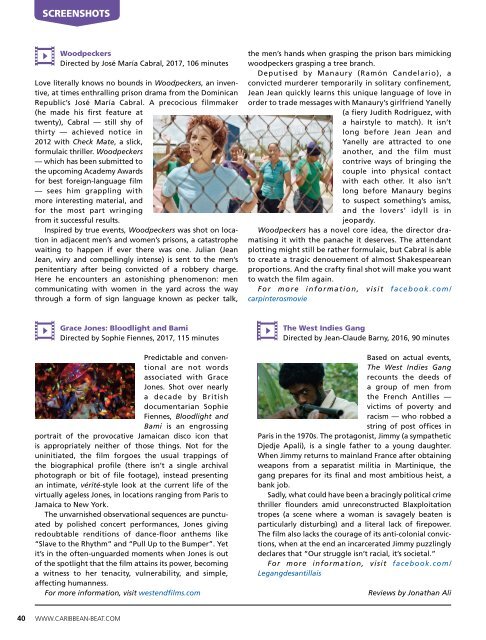Caribbean Beat — January/February 2018 (#149)
A calendar of events; music, film, and book reviews; travel features; people profiles, and much more.
A calendar of events; music, film, and book reviews; travel features; people profiles, and much more.
Create successful ePaper yourself
Turn your PDF publications into a flip-book with our unique Google optimized e-Paper software.
SCREENSHOTS<br />
Woodpeckers<br />
Directed by José María Cabral, 2017, 106 minutes<br />
Love literally knows no bounds in Woodpeckers, an inventive,<br />
at times enthralling prison drama from the Dominican<br />
Republic’s José María Cabral. A precocious filmmaker<br />
(he made his first feature at<br />
twenty), Cabral <strong>—</strong> still shy of<br />
thirty <strong>—</strong> achieved notice in<br />
2012 with Check Mate, a slick,<br />
formulaic thriller. Woodpeckers<br />
<strong>—</strong> which has been submitted to<br />
the upcoming Academy Awards<br />
for best foreign-language film<br />
<strong>—</strong> sees him grappling with<br />
more interesting material, and<br />
for the most part wringing<br />
from it successful results.<br />
Inspired by true events, Woodpeckers was shot on location<br />
in adjacent men’s and women’s prisons, a catastrophe<br />
waiting to happen if ever there was one. Julian (Jean<br />
Jean, wiry and compellingly intense) is sent to the men’s<br />
penitentiary after being convicted of a robbery charge.<br />
Here he encounters an astonishing phenomenon: men<br />
communicating with women in the yard across the way<br />
through a form of sign language known as pecker talk,<br />
the men’s hands when grasping the prison bars mimicking<br />
woodpeckers grasping a tree branch.<br />
Deputised by Manaury (Ramón Candelario), a<br />
convicted murderer temporarily in solitary confinement,<br />
Jean Jean quickly learns this unique language of love in<br />
order to trade messages with Manaury’s girlfriend Yanelly<br />
(a fiery Judith Rodríguez, with<br />
a hairstyle to match). It isn’t<br />
long before Jean Jean and<br />
Yanelly are attracted to one<br />
another, and the film must<br />
contrive ways of bringing the<br />
couple into physical contact<br />
with each other. It also isn’t<br />
long before Manaury begins<br />
to suspect something’s amiss,<br />
and the lovers’ idyll is in<br />
jeopardy.<br />
Woodpeckers has a novel core idea, the director dramatising<br />
it with the panache it deserves. The attendant<br />
plotting might still be rather formulaic, but Cabral is able<br />
to create a tragic denouement of almost Shakespearean<br />
proportions. And the crafty final shot will make you want<br />
to watch the film again.<br />
For more information, visit facebook.com/<br />
carpinterosmovie<br />
Grace Jones: Bloodlight and Bami<br />
Directed by Sophie Fiennes, 2017, 115 minutes<br />
Predictable and conventional<br />
are not words<br />
associated with Grace<br />
Jones. Shot over nearly<br />
a decade by British<br />
documentarian Sophie<br />
Fiennes, Bloodlight and<br />
Bami is an engrossing<br />
portrait of the provocative Jamaican disco icon that<br />
is appropriately neither of those things. Not for the<br />
uninitiated, the film forgoes the usual trappings of<br />
the biographical profile (there isn’t a single archival<br />
photograph or bit of file footage), instead presenting<br />
an intimate, vérité-style look at the current life of the<br />
virtually ageless Jones, in locations ranging from Paris to<br />
Jamaica to New York.<br />
The unvarnished observational sequences are punctuated<br />
by polished concert performances, Jones giving<br />
redoubtable renditions of dance-floor anthems like<br />
“Slave to the Rhythm” and “Pull Up to the Bumper”. Yet<br />
it’s in the often-unguarded moments when Jones is out<br />
of the spotlight that the film attains its power, becoming<br />
a witness to her tenacity, vulnerability, and simple,<br />
affecting humanness.<br />
For more information, visit westendfilms.com<br />
The West Indies Gang<br />
Directed by Jean-Claude Barny, 2016, 90 minutes<br />
Based on actual events,<br />
The West Indies Gang<br />
recounts the deeds of<br />
a group of men from<br />
the French Antilles <strong>—</strong><br />
victims of poverty and<br />
racism <strong>—</strong> who robbed a<br />
string of post offices in<br />
Paris in the 1970s. The protagonist, Jimmy (a sympathetic<br />
Djedje Apali), is a single father to a young daughter.<br />
When Jimmy returns to mainland France after obtaining<br />
weapons from a separatist militia in Martinique, the<br />
gang prepares for its final and most ambitious heist, a<br />
bank job.<br />
Sadly, what could have been a bracingly political crime<br />
thriller flounders amid unreconstructed Blaxploitation<br />
tropes (a scene where a woman is savagely beaten is<br />
particularly disturbing) and a literal lack of firepower.<br />
The film also lacks the courage of its anti-colonial convictions,<br />
when at the end an incarcerated Jimmy puzzlingly<br />
declares that “Our struggle isn’t racial, it’s societal.”<br />
For more information, visit facebook.com/<br />
Legangdesantillais<br />
Reviews by Jonathan Ali<br />
40 WWW.CARIBBEAN-BEAT.COM


















